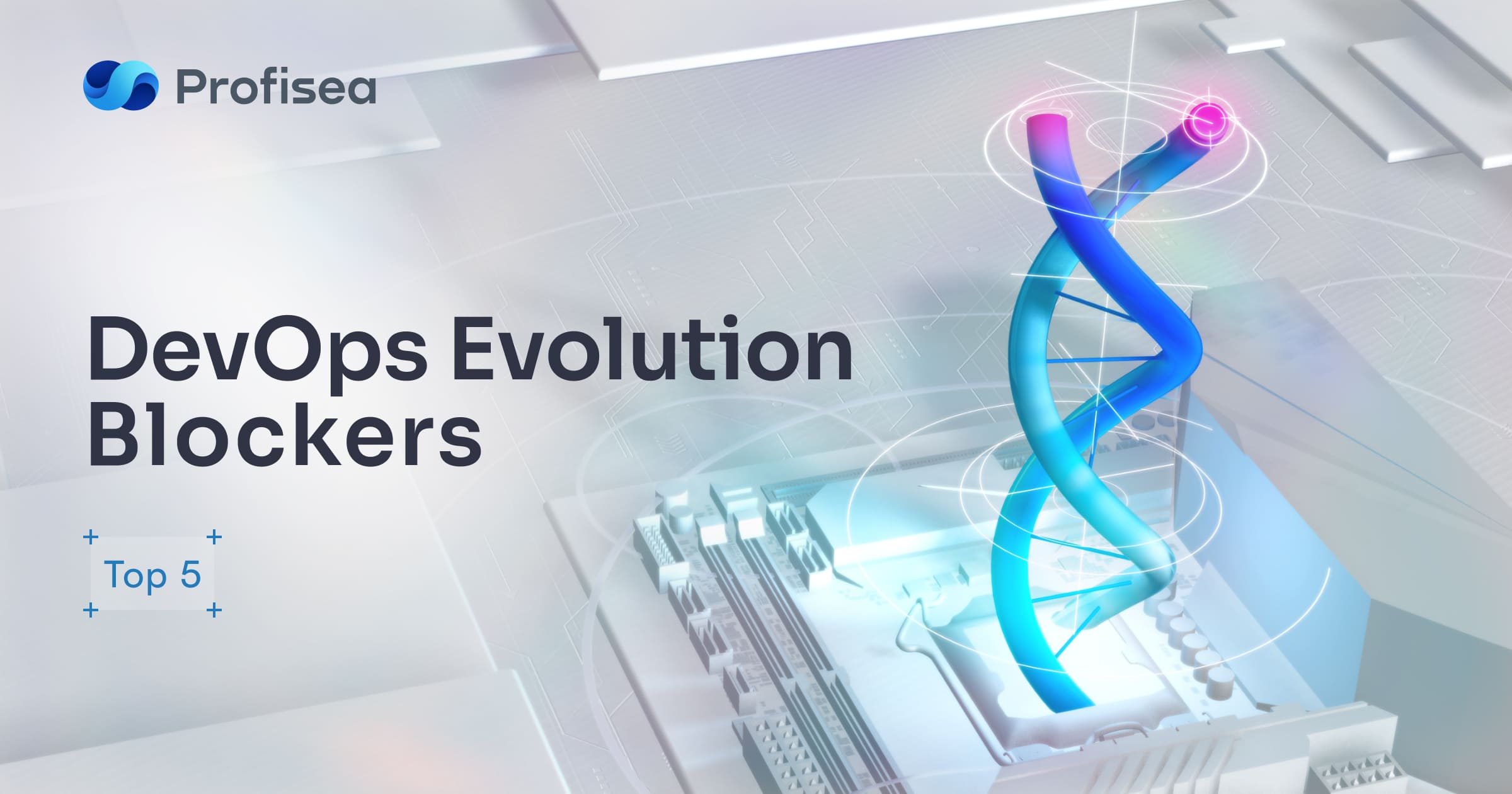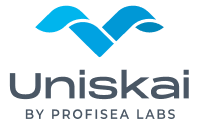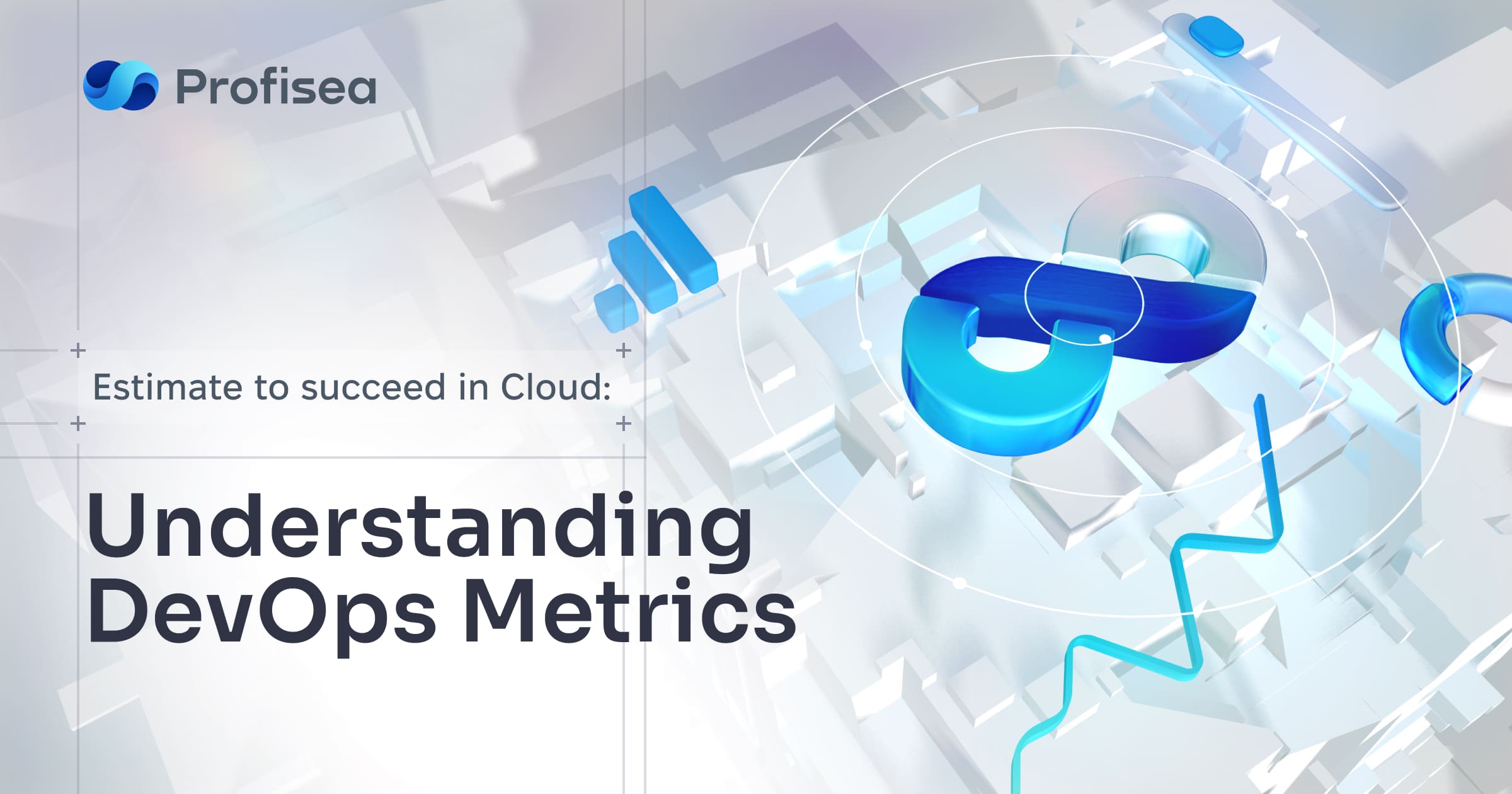Top 5 DevOps evolution blockers
Even though DevOps often confirms the claimed benefits, many companies have been stuck in the middle of their transformation journey, with organizational and cultural factors remaining the top DevOps evolution blockers.
A great number of companies implement DevOps nowadays, which, in theory, is a good thing. The actual problem is rushing into DevOps evolution without a clear understanding of how it works and taking DevOps for granted as a panacea for the secure delivery of applications and services at high velocity.
You might have invested in automation a lot – but the problem is that you haven’t addressed the organizational silos and misaligned incentives around deploying software to production. According to the research report,
only 10% of respondents say their companies are very successful at overcoming blockers to DevOps evolution, while 27% are “laggards” with unsuccessful quick development and implementation.
So, why do companies fail to adopt a new DevOps approach to working with technology? And what are those cultural, organizational, and process blockers to DevOps evolution businesses face?
We have leveraged our deep expertise to give you the answers. Let’s discuss it blocker by blocker in our blog article.
DevOps evolution blockers
DevOps evolution blocker #1: Traditional processes and technologies
Breaking old habits can be extremely challenging. Though DevOps requires changes and shifts across the organization, it’s not just about implementing new technology.
Instead, it’s much more about people, processes, and then technology. Your biggest mistake might be focusing only on one or two key elements, while DevOps evolution requires all three: culture change, agile processes, and new technologies.
According to the Harvard Business Review Report,
- 50% of enterprises say organizational silos are the greatest challenges to delivering value to the market faster;
- 49% cite monolithic architectures, physical servers, and waterfall methodologies as a DevOps evolution blocker;
- 46% say resistance to change is a major issue.
DevOps approach involves team collaboration and product orientation when all business processes become increasingly agile, with continuous delivery and automation everywhere. Also, new technologies – clouds, containers, microservices, APIs, serverless technologies, etc. – must be adopted.
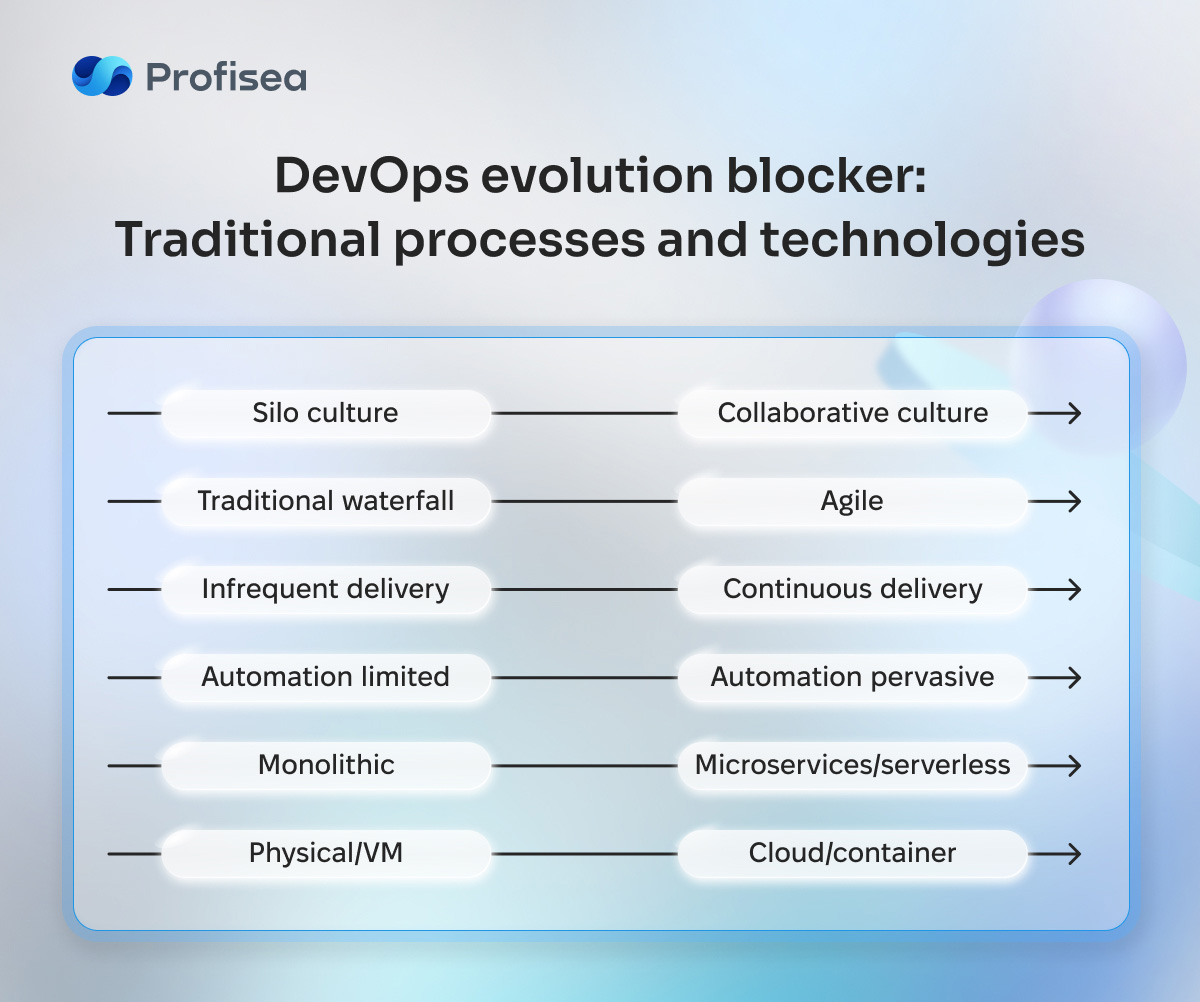
Leaving traditional technologies aside and shattering old business mindsets, companies get extremely effective SDLC, with continuous delivery of new features and continuous improvements that satisfy all the customers’ demands.
DevOps evolution blocker #2: Dev and Ops gap
According to Atlassian DevOps Trends Survey, 46% of organizations are relatively new to DevOps, with less than 3 years of such experience. Thus, they do not understand whether their processes are development-oriented or activity-oriented. It happens because of the traditional conflicts between development and operational goals.
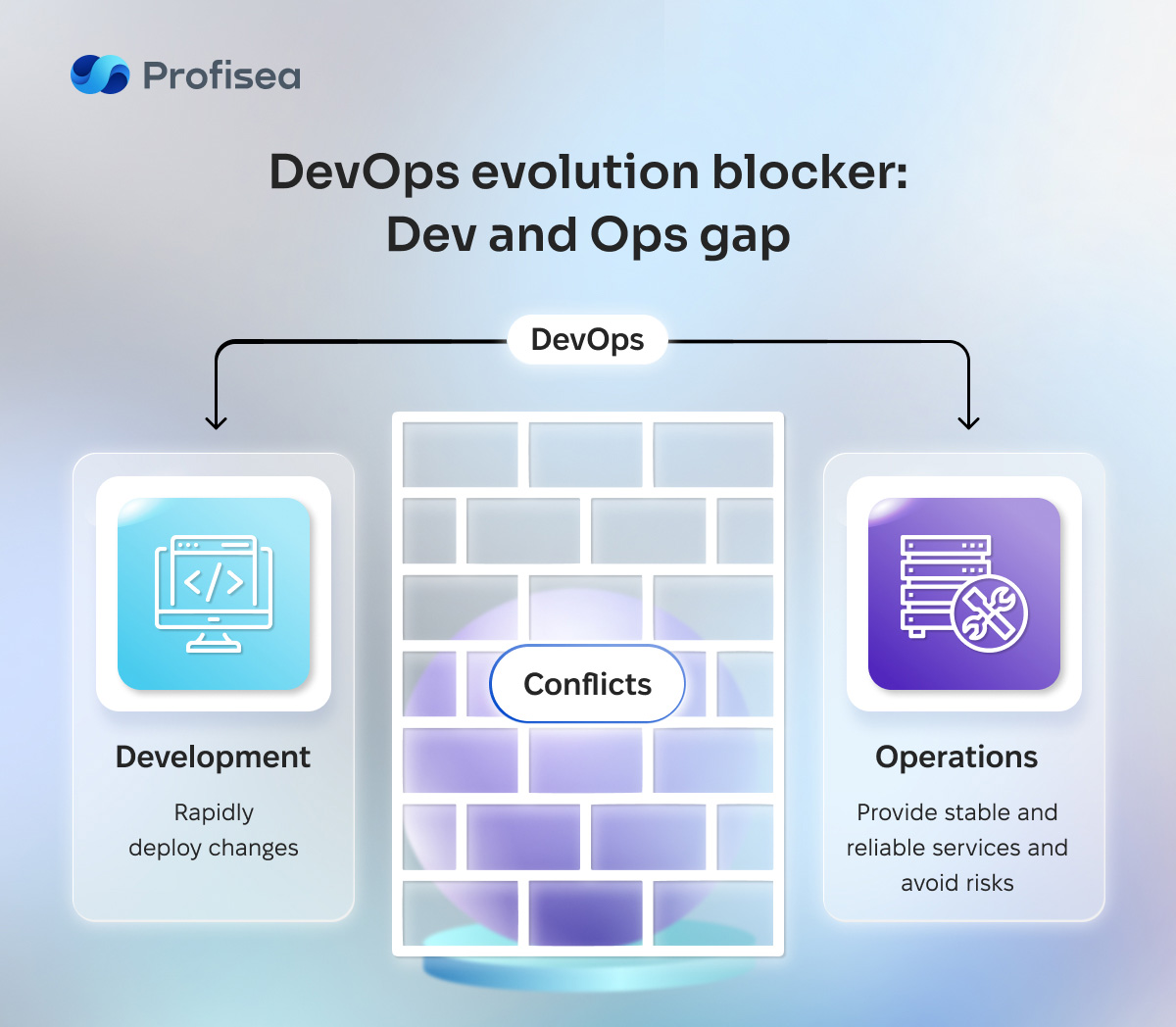
The best solution here is building collaboration between development and deployment teams, namely through DevOps. It can be achieved when you recognize the existing confrontation between Dev and Ops and encourage collaboration between all your teams.
Profisea recommends trying DevOps first at a small scale or at a separate stage of deployment. You cannot manage what you cannot measure. Thus, our DevOps –savvy engineers define KPIs (deployment speed, deployment frequency, bug quantity, etc.) for the test run to start adoption.
Throughout this trial, your teams learn to communicate, respond to feedback, analyze their KPIs, and use best DevOps tools to reach the main goal – rapid development, high-quality software delivery, reducing costs and risks for the organization’s and end users’ benefits.
Based on these trial results, soon your business will soon start scaling DevOps operations up, expanding to more teams and more workflows.
DevOps evolution blocker #3: Lack of deployment strategies
Depending on where your company is in DevOps evolution, it may or may not have learned how to implement deployment strategies. These strategies focus on high-quality deployment and risk management to launch a new version of the software solution successfully.
Deployment strategies include A/B, Blue/Green, Recreate, Ramped, Shadow, Canary, etc. Each of them recognizes that there are many types of changes, and not all of them meet the same standard. You should test changes first to check their quality and only then implement them with confidence. And this process can be repeated with continuous experiments.
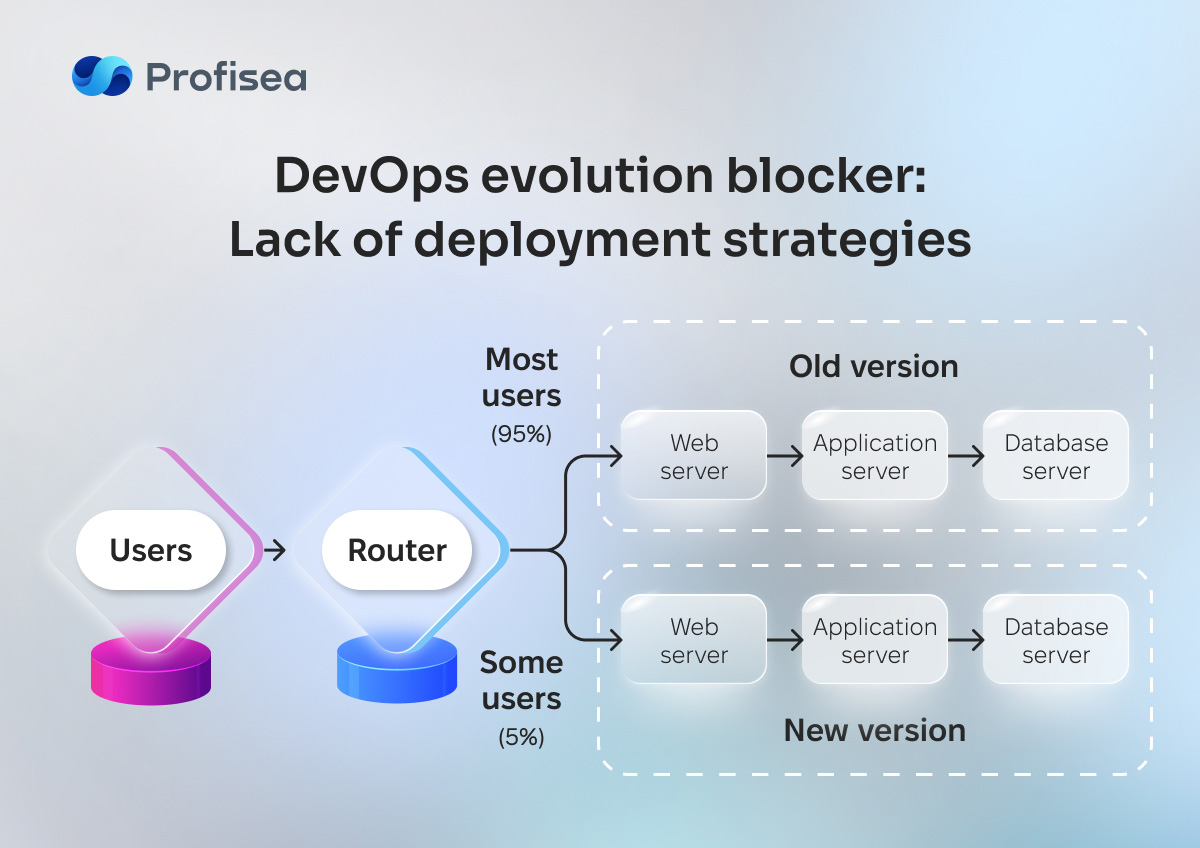
The main benefits of rapid, controlled implementation of changes are reduced downtime and reduced risks that make companies more efficient by delivering high-quality features to their end users more frequently.
Adopting deployment strategies may not be the first thing you do when implementing DevOps, but it would be a mistake to overlook the benefits of using more advanced forms of deployment as your DevOps implementation evolves.
Launching new features successfully with any deployment strategy isn’t an easy task. DevOps teams need to understand what values they are shipping to their users. Fortunately, Profisea offers solutions to launch and release new features for your products with any deployment strategies.
DevOps evolution blocker #4: It is all about money
Investing in DevOps may seem expensive and intimidating at first glance, but ROI can be achieved relatively quickly.
However, cost savings should not be the only goal! One of the main benefits of DevOps is the reduction of routine manual processes, which also means fewer human errors. It eliminates the risks of interruptions in deploying different environments and saves time by reducing errors associated with subsequent debugging.
Automation increases the speed and frequency of software delivery. It helps you keep up with your competitors and the industry as a whole, which is growing at an ever-faster pace.
In addition to cost savings and automation, employee satisfaction and retention are improved by reducing tedious manual activities. Now your developers can do what they love – development!
In the long run, these benefits will help you save money. When employees are satisfied, productivity is high, releases are faster, and end customers are happy – only then you don’t have to spend more money on hiring new employees.
DevOps evolution blocker #5: Fear of starting DevOps
The biggest chance to fail in DevOps evolution is to… never start. DevOps evolution may seem like a huge, intimidating task, but remember that “DevOps” means a lot of different things. Most companies are moving towards DevOps right now. And you may be losing in the market because you are not as competitive as they are.
Resistance to change is the biggest cultural challenge that holds back a lot of companies from adopting DevOps practices. Remember: it’s all about your next step! Do not wait. The risks associated with doing nothing are much higher than with starting your DevOps journey.
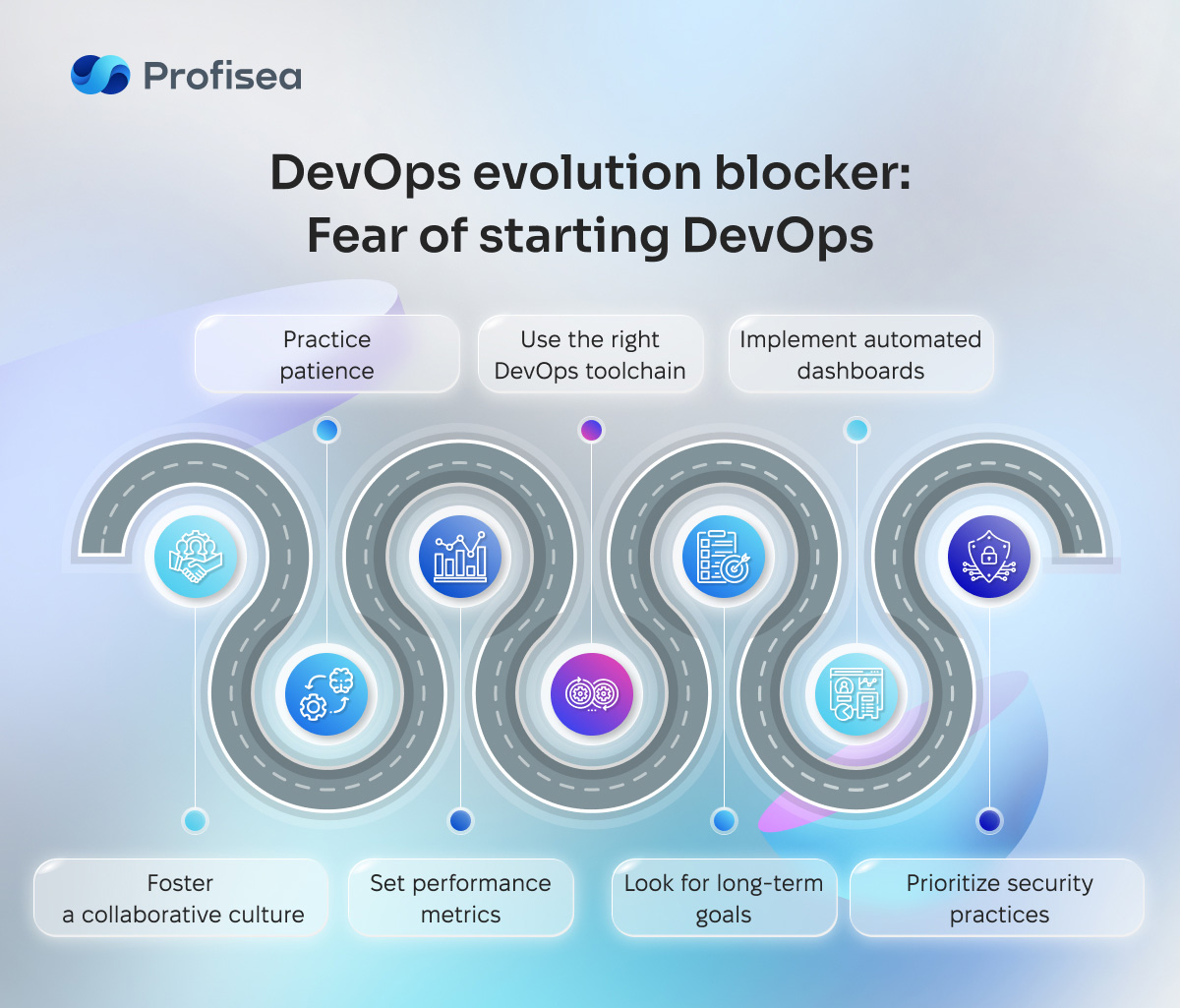
Take one identical step at a time. Break the problem space into parts. Start learning and keep learning with new DevOps practices. Contact the best DevOps professionals.
As automation, cost reduction, and security are at the heart of Profisea, we implement best DevOps practices to provide your business with numerous benefits, including agile thinking, a culture of collaboration, and the continuity of everything: continuous integration, continuous delivery, continuous deployment, and continuous full-blown DevOps efficiency.
Profisea: Sail DevOps waters smoothly
Profisea is an Israeli boutique DevOps and Cloud company providing a full spectrum of cloud management services, from smart customization of existing Cloud Infrastructures to end-to-end Cloud Infrastructure designing & optimization that meets your vision and unique business requirements.
Since 2015, we have been implementing top practices of GitOps, DevSecOps, and FinOps, and providing Kubernetes-based infrastructure services to help businesses of all sizes – SMB, SME, or large enterprises to transform their organizational mindsets, increase productivity, and boost performance.
Experienced DevOps, NOC, SRE engineers, project managers, FinOps practitioners, Cloud Architects, and QA specialists – Profisea experts will temporarily become a part of your team to design, build, operate, secure, and scale unique cloud environments.
Get in touch with Profisea now – and take control, manage, and design complex production-ready infrastructure with no deployment downtime forever!
